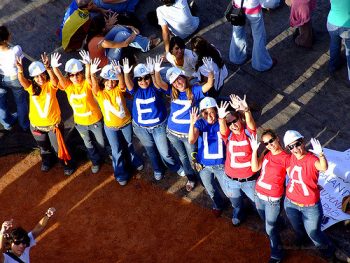Venezuelan Spanish and the Plethora of Colloquialisms Posted by Anais on Mar 18, 2019 in Spanish Vocabulary
Languages are much more than what books teach us. For example, English offers a more picturesque repertoire than just OK, no problem, or the well-known “f-word”.
Similarly, Spanish—and Venezuelan Spanish in this case—has a colorful lexicon that, if used by a non-native, makes you sound more natural and closer to other speakers.
In that sense, chévere is usually placed at the top of Venezuela’s most popular colloquialisms, as it is extensively used to express your happiness or delight about a situation. For example:
–Conseguiste el empleo. ¡Qué chévere! (You got the job. What a good thing/How nice!)
However, this post is dedicated to the other colloquialisms that make the list of most common Venezuelan idioms. Warning: Many of these words may be considered vulgar in certain social settings. Use them wisely!
Epa and mira
Let’s begin with epa and mira, which are employed to call attention to yourself at the start of any conversation:
- Epa, ¿qué pasó? (Hey, what’s up?)
- Mira, cuéntame de tu día. (Hey, tell me about your day.)
Vale
Vale is a word that gives emphasis to your yes-or-no statements:
- ¿Llegaste bien a casa? (Did you get home well?); Sí, vale, llegué bien. (Yes, of course I did.)
- ¿Conseguiste lo que buscabas? (Did you find what you were looking for?); No, vale, nada. (No, not at all.)
Coño
Coño is one of those “nice” words that began as a swear (it literally means ‘female genitalia’) and ended up being used everywhere to “spice up” your phrases:
- Coño, ¡qué sorpresa! (What a surprise!)
- Pero, coño, no seas impaciente! (Don’t be impatient!)
You can use coño alone or alongside vale to create an untranslatable expression that clearly shows how deep your discomfort is towards a situation:
- Coño vale, ¡qué problema tan grande! (What a problem!)
Because some people consider coño too rude, they rely on its milder versions, cónchale and coye.
Interjections for every need
In cases where you need to show how amazed you are by something—be it positively or negatively— no joda and its variations will be there for your linguistic needs:
- No joda, mi celular se dañó (Damn, My cellphone broke!)
- Perdí el autobús, no hombre (Heck, I missed the bus!)
- ¡Ganó mi equipo! Así se juega, no jo (My team won! That’s how you play, damn it!)
- No juegue, yo aproveché y me metí en la fiesta (Damn, I just saw the chance and broke into the party)
Meanwhile, broma, vaina and verga* are chiefly used as a ruder way of referring to an indeterminate object, or even your own mood facing an unfortunate event:
- ¿Qué broma es esa? (What is that thing there?)
- ¿Y esa vaina? (What is that thing?/What just happened?)
- ¡No entiendo esta verga! (I don’t understand this thing!)
- ¡Qué broma!/¡Qué vaina!/¡Qué verga! (How unfortunate!/What a bad thing to happen!)
*It is worth mentioning that verga is another word for male genitalia.
Coming back to the subject of amazement and frustration, in Venezuela there are many more ways of expressing yourself:
- Na guará de difícil esta tarea (What a difficult homework!)
- Na guará, está haciendo mucho frío (It is very cold right now!)
There are other useful expressions for many more situations. Say you want to dismiss something as being too unbelievable to be true: just say out loud eche; sí, Luis; or ponte a creer to make your point clear.
- – Terminé el proyecto en dos días nada más. (I finished the project in just two days.); Sí, Luis (Yeah, “right”!).
- –¿Te ganaste la lotería? ¡Eche! (You won the lottery? Yeah, I “believe” that.)
What about a frightening event? Just say out loud the word susto and you’ll be conveying how afraid the people around you should be.
- – ¡Susto! Acabo de ver un fantasma (What a shock! I have just seen a ghost)
Regionalisms within Venezuela
Regional expressions aren’t just limited to countries in Latin America—even within Venezuela expressions vary. People coming from Zulia state (on the western part of the country) love to show off their roots by using qué molleja and vergación in the same manner as no joda, verga or na guará.
- ¡Qué molleja de casa la tuya! (What an awesome house of yours!)
- Vergación, ¿viste esa vaina? (Did you see that thing?)
On the other hand, inhabitants of los Llanos like to say caracha, their own version of caramba, when surprised.
- Caracha, ese caballo sí es bonito. (That’s a pretty horse.)
With its myriad idioms, Venezuelan Spanish is one of the most flavorful Spanish variants. ¡Na guará, tremendo idioma, no jo! ¡Qué chévere es hablar español, vale!

Build vocabulary, practice pronunciation, and more with Transparent Language Online. Available anytime, anywhere, on any device.





Comments:
Margaret Nahmias:
Thanks this helped understand some of the regionalisms used in the El Politigato cartoons